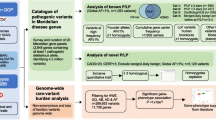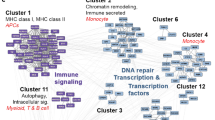Abstract
Recently, we described the association of genetic variation in the discs large homolog 5 (DLG5) gene with inflammatory bowel disease (IBD) in a large European study sample (Stoll et al. in Nat Genet 36:476–480, 2004). Here, we report that the R30Q variant constitutes a susceptibility factor for Crohn disease (CD) in men [odds ratio (OR)=2.49, 95% confidence interval (CI) 1.53–4.06, P<0.001] but not women (OR=1.01, 95% CI=0.70–1.45, P=0.979) using multivariate logistic regression analyses in a unified study sample from Germany, Italy and Quebec. R30Q is a significant predictor for CD in men even when accounting for CARD15 and IBD5 risk variants (adjusted OR=2.41, 95% CI=1.41–4.12, P=0.001). The observed association is driven by a gender-dependent transmission ratio distortion (TRD) among healthy controls (frequency of Q allele: men 5.2%, women 11.3%), an effect that is offset in CD patients (frequency of Q allele: men 10.1%, women 10.9%). This finding is further substantiated by two non-IBD study samples, one of which consists of a newborn screening sample (newborn males 7.1%; newborn females 11%, P=0.036). Further investigation of the observed TRD may contribute towards enlightening the role of DLG5 in physiological processes influencing transmission of chromosomes to the surviving offspring, which, in turn, may help in understanding its implication in the development of CD among men.

Similar content being viewed by others
References
Arnott ID, Nimmo ER, Drummond HE, Fennell J, Smith BR, MacKinlay E, Morecroft J, Anderson N, Kelleher D, O’Sullivan M, McManus R, Satsangi J (2004) NOD2/CARD15, TLR4 and CD14 mutations in Scottish and Irish Crohn’s disease patients: evidence for genetic heterogeneity within Europe? Genes Immun 5:417–425
Daly MJ, Pearce AV, Farwell L, Fisher SA, Latiano A, Prescott NJ, Forbes A, Mansfield J, Sanderson J, Langelier D, Cohen A, Bitton A, Wild G, Lewis CM, Annese V, Mathew CG, Rioux JD (2005) Association of DLG5 R30Q variant with inflammatory bowel disease. Eur J Hum Genet 13:835–839
Fisher SA, Hampe J, Macpherson AJ, Forbes A, Lennard-Jones JE, Schreiber S, Curran ME, Mathew CG, Lewis CM (2002) Sex stratification of an inflammatory bowel disease genome search shows male-specific linkage to the HLA region of chromosome 6. Eur J Hum Genet 10:259–265
Giallourakis C, Stoll M, Miller K, Hampe J, Lander ES, Daly MJ, Schreiber S, Rioux JD (2003) IBD5 is a general risk factor for inflammatory bowel disease: replication of association with Crohn disease and identification of a novel association with Ulcerative Colitis. Am J Hum Genet 73:205–211
Hampe J, Schreiber S, Shaw SH, Lau KF, Bridger S, Macpherson AJ, Cardon LR, Sakul H, Harris TJ, Buckler A, Hall J, Stokkers P, van Deventer SJ, Nurnberg P, Mirza MM, Lee JC, Lennard-Jones JE, Mathew CG, Curran ME (1999) A genome wide analysis provides evidence for novel linkages for inflammatory bowel disease in a large European cohort. Am J Hum Genet 64:808–816
Hampe J, Cuthbert A, Croucher PJ, Mirza MM, Mascheretti S, Fisher S, Frenzel H, King K, Hasselmeyer A, MacPherson AJ, Bridger S, van Deventer S, Forbes A, Nikolaus S, Lennard-Jones JE, Foelsch UR, Krawczak M, Lewis C, Schreiber S, Mathew CG (2001) Association between insertion mutation in NOD2 gene and Crohn’s disease in German and British populations. Lancet 357:1925–1928
Hugot JP, Chamaillard M, Zouali H, Lesage S, Cezard JP, Belaiche J, Almer S, Tysk C, O’Morain CA, Gassull M, Binder V, Finkel Y, Cortot A, Modigliani R, Laurent-Puig P, Gower-Rousseau C, Macry J, Colombel JF, Sahbatou M, Thomas G (2001) Association of NOD2 leucine-rich repeat variants with susceptibility to Crohn’s disease. Nature 411:599–603
Humbert P, Russell S, Richardson H (2003) Dlg, Scribble and Lgl in cell polarity, cell proliferation and cancer. Bioessays 25:542–553
Kitzis A, Chomel JC, Haliassos A, Tesson L, Kaplan JC, Feingold J, Giraud G, Lable A, Dastugue B, Dumur V et al (1988) Unusual segregation of cystic fibrosis alleles. Nature 336:316
Kugathasan S, Loizides A, Babusukumar U, McGuire E, Wang T, Hooper P, Nebel J, Kofman G, Noel R, Broeckel U, Tolia V (2005) Comparative phenotypic and CARD15 mutational analysis among African American, Hispanic, and White children with Crohn’s disease. Inflamm Bowel Dis 11:631–638
Lennard-Jones J (1989) Classification of inflammatory bowel disease. Scand J Gastroenterol 24:2–6
Loftus EV Jr (2004) Clinical epidemiology of inflammatory bowel disease: Incidence, prevalence, and environmental influences. Gastroenterology 126:1504–1517
McGovern DP, Van Heel DA, Negoro K, Ahmad T, Jewell DP (2003) Further evidence of IBD5/CARD15 (NOD2) epistasis in the susceptibility to ulcerative colitis. Am J Hum Genet 73:1465–1466
Mirza MM, Fisher SA, King K, Cuthbert AP, Hampe J, Sanderson J, Mansfield J, Donaldson P, Macpherson AJ, Forbes A, Schreiber S, Lewis CM, Mathew CG (2003) Genetic evidence for interaction of the 5q31 cytokine locus and the CARD15 gene in Crohn disease. Am J Hum Genet 72:1018–1022
Naumova AK, Greenwood CM, Morgan K (2001) Imprinting and deviation from Mendelian transmission ratios. Genome 44:311–320
Noble CL, Nimmo ER, Drummond H, Smith L, Arnott ID, Satsangi J (2005) DLG5 variants do not influence susceptibility to inflammatory bowel disease in the Scottish population. Gut 54:1416–1420
Ogura Y, Bonen DK, Inohara N, Nicolae DL, Chen FF, Ramos R, Britton H, Moran T, Karaliuskas R, Duerr RH, Achkar JP, Brant SR, Bayless TM, Kirschner BS, Hanauer SB, Nunez G, Cho JH (2001) A frameshift mutation in NOD2 associated with susceptibility to Crohn’s disease. Nature 411:603–606
Pardo-Manuel de Villena F, Sapienza C (2001) Nonrandom segregation during meiosis: the unfairness of females. Mamm Genome 12:331–339
Paterson AD, Sun L, Liu XQ (2003) Transmission ratio distortion in families from the Framingham Heart Study. BMC Genet 4(Suppl 1):S48
Rioux JD, Daly MJ, Silverberg MS, Lindblad K, Steinhart H, Cohen Z, Delmonte T et al (2001) Genetic variation in the 5q31 cytokine gene cluster confers susceptibility to Crohn disease. Nat Genet 29:223–228
Stoll M, Corneliussen B, Costello CM, Waetzig GH, Mellgard B, Koch WA, Rosenstiel P, Albrecht M, Croucher PJ, Seegert D, Nikolaus S, Hampe J, Lengauer T, Pierrou S, Foelsch UR, Mathew CG, Lagerstrom-Fermer M, Schreiber S (2004) Genetic variation in DLG5 is associated with inflammatory bowel disease. Nat Genet 36:476–480
Török HP, Glas J, Tonenchi L, Lohse P, Müller-Myhsok B, Limbersky O, Neugebauer C, Schnitzler F, Seiderer J, Tillack C, Brand S, Brünnler G, Jagiello P, Epplen JT, Griga T, Klein W, Schiemann U, Folwaczny M, Ochsenkühn T, Folwaczny C (2005) Polymorphisms in the DLG5 and OCTN cation transporter genes in Crohn’s disease. Gut 54:1421–1427
Vermeire S, Wild G, Kocher K, Cousineau J, Dufresne L, Bitton A, Langelier D, Pare P, Lapointe G, Cohen A, Daly MJ, Rioux JD (2002) CARD15 genetic variation in a Quebec population: prevalence, genotype–phenotype relationship, and haplotype structure. Am J Hum Genet 71:74–83
Van Belle G, Fisher LD, Heagerty PJ, Lumley T (2004) Biostatistics: a methodology for the health sciences, 2nd edn. Wiley, Hoboken, pp 552–557
Wakabayashi M, Ito T, Mitsushima M, Aizawa S, Ueda K, Amachi T, Kioka N (2003) Interaction of lp-dlg/KIAA0583, a membrane-associated guanylate kinase family protein, with vinexin and beta-catenin at sites of cell-cell contact. J Biol Chem 278:21709–21714
Wild GE, Rioux JD (2004) Genome scan analyses and positional cloning strategy in IBD: successes and limitations. Best Pract Res Clin Gastroenterol 18:541–553
Zöllner S, Wen X, Hanchard NA, Herbert MA, Ober C, Pritchard JK (2004) Evidence for extensive transmission distortion in the human genome. Am J Hum Genet 74:62–72
Acknowledgments
The authors would like to thank all cooperating clinical centres, clinicians, families and patients with IBD. Also, special thanks to the German Crohn’s and Colitis Foundation for their invaluable participation in the patient collection as well as to gastroenterologists Alain Bitton, Albert Cohen, Gary Wild and Diane Langelier from Quebec. This study was supported by the Federal Ministry of Science and Education through the National Genome Research Network, the Competence Network “Inflammatory Bowel Disease” and the Italian Ministry of Health (RC0503GA18).
Author information
Authors and Affiliations
Corresponding author
Additional information
Frauke Friedrichs and Sonia Brescianini equally contributed to the work.
Rights and permissions
About this article
Cite this article
Friedrichs, F., Brescianini, S., Annese, V. et al. Evidence of transmission ratio distortion of DLG5 R30Q variant in general and implication of an association with Crohn disease in men. Hum Genet 119, 305–311 (2006). https://doi.org/10.1007/s00439-006-0133-1
Received:
Accepted:
Published:
Issue Date:
DOI: https://doi.org/10.1007/s00439-006-0133-1




